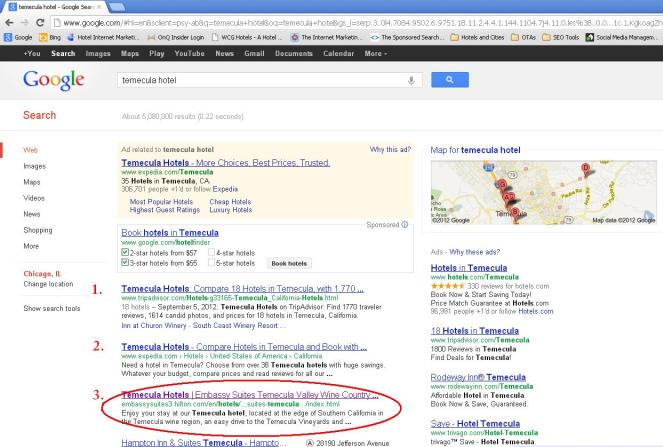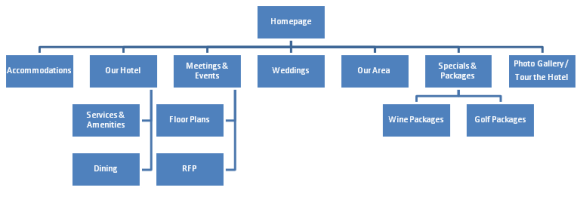Travelers are increasingly booking via the internet, with greater transparency and options more prevalent than ever. In a Google study conducted in 2011, 37% of leisure travelers report that the internet prompted them to book, up from 28% two years ago. Over 70% of travelers conduct research online before booking a hotel room. Specifically, search engines are some of the primary tools in the arsenal of the travel researcher.
But how can a guest learn about your hotel or make a reservation online if they can’t find your hotel’s website?
That’s where search engine optimization, commonly known as SEO, comes to the rescue! Utilizing the right SEO strategy will get your website in front of your targeted online audience, attract potential guests and ultimately increase your online reservations and revenue.
What is Search Engine Optimization (SEO)?
SEO is the process of building and maintaining various components of a website in order to increase the number of visitors to that site from search engines. The effectiveness of SEO is ultimately measured by the position of a website on a search engine results page (SERP) when searching for a certain keyword. In general, the higher your website is ranked on the search results page, the more visitors it will receive from the search engine’s users.
A common misconception about SEO is that it is strictly about targeting the right keywords to reach your audience. The truth is that SEO is an ongoing process that involves multiple facets – from the words or “copy” on each page of your website to the way other sites link to you on the web. SEO even includes building your website’s architecture so that it is structured in a way that search engines can “crawl” it and understand your content. In a good SEO strategy, your hotel’s website isn’t just optimized for search engines: it’s also about making your web site better for guests too!
Why Does my Hotel’s Website Need SEO?

Google and Bing are two major search engines that likely drive the majority of online traffic to your hotel’s website. There are other online avenues that generate visits to your website, such as social media, online travel agencies (OTAs), or travel blogs, but search engines are the preferred method of navigation for most Internet users and travelers. Search engines offer a unique online opportunity – they provide targeted visitors – people who are looking for exactly what you offer. As it relates to Google’s 5 Stages of Travel, SEO helps hotels capture guests in stages 2 and 3 – planning and booking! Travelers who are researching their travel to a “Chicago hotel” or “hotel in Chicago” should be able to find your hotel’s website right away if those keywords match your hotel’s description and you are utilizing the right SEO strategy. If your hotel’s website cannot be found by search engines, then you are missing out on valuable guests, occupancy, and revenue.
Specific Factors that Contribute to your Hotel Websites’ Ranking Success:
At Blue Magnet, we can effectively summarize search engine optimization as the integration of the following three components to your hotel website:
- Architecture
- Content
- Reputation
Architecture
The first key component of search engine optimization has to do with the overall structure of your site and its technical coding. SEO seeks to pair the website address (domain name), the internal code of the website and the content of your site with the keywords that users search for in Google. This is called building relevancy. Architectural website components such as your choice of domain name (website address), the directory structure of your web pages, the simplicity of your webpage code, effective use of sitemaps, and lack of broken links or missing pages can all contribute to your hotel website’s visibility (or lack thereof) in major search engines. Remember that a webpage is viewed differently from the crawlers of a search engine vs. the eyes of a human being. The key is to mesh the structural components so that both search engines and human visitors can find and read your website.
Content
When people hear the term “search engine optimization,” most people think that this is the sole component of an SEO strategy. The fact is this is only one piece of the entire SEO puzzle. Optimizing content refers to conducting keyword research in order to determine which search queries people are typing into the search engines to find your hotel. Remember, it’s not always about getting any ol’ visitors to your site, but about getting the right, qualified kind of visitors.
Through the detective work of researching and analyzing your hotel’s keyword demand, you not only learn which terms and phrases to target with SEO, but also learn more about your potential guests as a whole. Some of the most popular keywords for hotels are “hotel in CITY,” “CITY hotel,” or “hotel near ATTRACTION.” Once these keywords for your specific hotel and location have been selected, they can be properly integrated in the visible text of your website. Search engines have become savvier in that they can decipher between well written content for human consumption versus content written specifically to achieve higher search engine rankings. It is up to a balanced SEO strategy to integrate your hotel’s chosen keywords and phrases in a natural way throughout your site that will help search engines and users alike understand exactly what your website can offer.
Keywords must be effectively integrated into many different areas of the site, including body text, meta tags, image alt tags, captions, PDFs and more. For a great example of this, check out a great blog post from SEOmoz that provides a great overview using a reference to chocolate donuts. In addition, even though they are considered part of the back-end code of the site, it’s also important to integrate important keywords into the meta tags of your site. Meta tags are a great way for webmasters to provide search engines with information about their sites which aids in higher search engine rankings. Two of most important meta tags are the title tag and the meta description tag. The title tag is intended to be a concise description of a page’s content built from keywords. It is a key component to both search engine optimization and a user’s experience. The meta description is a short description of the page’s content that is displayed as the snippet of text beneath a search engine result listing. Although these days the description meta tag has no impact on your search engine rankings, the copy you write for this tag will impact the clickthrough rate for the listing since it will often be displayed in the search results. A well-written description tag could mean the difference between a potential guest clicking on your listing and clicking on your competitor’s listing. To produce the greatest amount of traffic to your website at the highest conversion rate for your hotel, incorporate a solid keyword strategy, relevant and fresh content, and targeted meta tags.
Reputation

Your website’s reputation is one of the more complex and possibly the most difficult component of successful search engine optimization campaigns. Search engines view your hotel’s online reputation as a combination of numerous factors, including inbound links to your hotel’s website, the age of your domain, the level of proficiency expressed within the content of your site, and your social media profiles. When outlining your link strategy, you want to focus on high quality inbound links to your website. These can be found in the form of relevant industry sites, travel bloggers, niche market sites, event and attraction websites, and Convention Visitors Bureau (CVB) websites. A solid link building strategy is imperative to the success of your SEO strategy because major search engines consider each inbound link to your site as a “vote” for your reputation. Search engines with give you a better reputation with the more high-quality votes your site gets from other relevant websites. Hotels can optimize their websites for keywords till they turn blue in the face, but unless they get the link support from other reputable sites they will never outrank the competition.
Another crucial factor in a website’s search engine rankings is valuable content. This point ties into the content section we discussed earlier, but the value and importance of your content is a another influencing factor in your reputation in the search engines. If you have strong, compelling web content, you are more likely to draw in new visitors to your site and attract high quality links. So ultimately, by creating interesting content, you are increasing the number of quality inbound links, thus boosting your site’s overall reputation, and finally increasing your website’s search engine ranking!
Lastly, one aspect of SEO that is often forgotten is the impact of social media on search engine rankings and your online reputation. Search engines such as Google and Bing are now taking social cues into consideration in ranking your site. The connections you have within your network and the sites that are favored within that network will likely appear more prominently in your own personal searches. Most hotels make a big mistake by ignoring social media as part of their online marketing strategy. Provided you have the resources to maintain such communication, we recommend establishing a profile and constantly engaging with your community on the following sites, in order to aid your online marketing strategy and manage your online reputation:
- Foursquare
- YouTube
Here are some tips to best integrate SEO into your social media profiles:
- Name your profiles correctly and fill out the entire profile completely – Use the full name of your hotel across all social media channels. All areas of the profile should be completed: photos, bio, videos, links, topics, tags – whatever the channel offers, take full advantage of it.
- Leverage your social media active contacts – friend/follow/connect with them on each of the platforms and interact with these contacts on a regular basis.
- Link to legitimate accounts – Remember relevance is important and if the social media profile of a group or user looks unnatural or keyword-stuffed, your reputation is at risk
Invest in your social media profiles and they’ll reward you with enhanced visibility within search engine results.
Can search engines still find my hotel’s website without SEO?
Each year, Google changes its search algorithm anywhere from 500-600 times! And those are just the updates us SEO folks know about! Most of these changes are very minor, but every few months Google rolls out a “major” algorithm change that heavily impacts search results (you may have heard of the Google “Panda Update” or the “Penguin Update”). The major search engines are always working towards improving their algorithm and technology to crawl the internet more thoroughly and return better results to users. However, search engines are not perfect and there is a limit to how they can operate. Just as using the right SEO tactics can grant you thousands of visitors and bookings, the wrong SEO tactics can hide your site deep in the search results where visibility is minimal. How many search results pages are guests going to go through to find your hotel? One? Two? Three? The majority of internet users never venture past the first or second page of search results. Since the Internet is becoming increasingly competitive, those hotels that utilize a solid SEO strategy will continue to rank on the first page of search engines and will have a greater advantage in reaching new travelers.
All these areas of SEO can seem a bit daunting–from discovery of the terms and phrases (keywords) that generate traffic, to building a site that is search engine friendly, to acquiring the links and marketing the unique value of your hotel and your hotel’s website. But remember, if guests cannot find your hotel online, they won’t be able to learn about your property or make a reservation.







